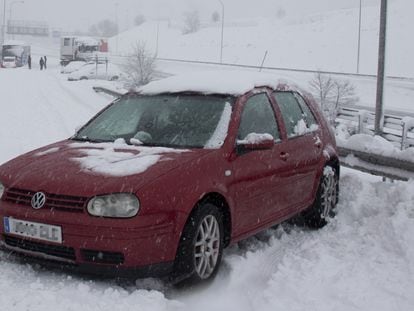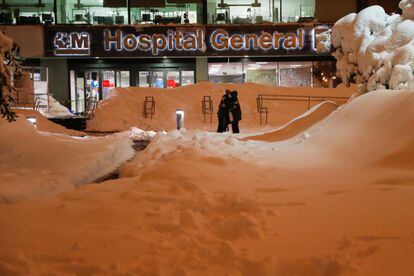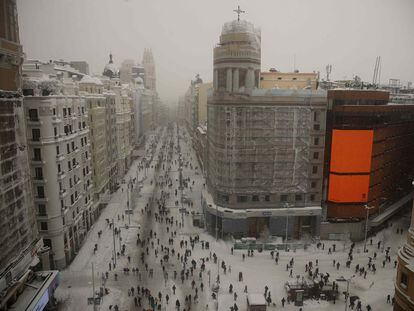Spanish government organizes convoys to get essential products, Covid vaccine moving
The Military Emergency Unit has been deployed to clear snow from Madrid’s hospitals and airport. Around 500 people had to sleep in sports centers last night after being left stranded by the weather
/cloudfront-eu-central-1.images.arcpublishing.com/prisa/WTMNQ37TS2LSBXDFLMWXM3RPEM.jpg)
The harshest weather event seen in Spain in the last 50 years exceeded even the worst scenarios imagined by the central government ahead of the arrival of Storm Filomena. The main concern now for the central administration is to avoid a repeat of the traffic problems seen in 2018, when vehicles were trapped on the AP-6 freeway due to snow, and reopen routes for the supply of essential products and medication. The transport, storage and distribution of the Pfizer-BioNTech Covid-19 vaccine is also a key priority.
For the coalition government, led by the Socialist Party (PSOE) with junior partner Unidas Podemos, a relatively quiet week in political terms was interrupted by the worst storm in half a century on Friday. Transport Minister José Luis Ábalos said the next day that the combination of so much snowfall, heavy rain and strong winds over a period of hours was “exceptional,” and as such had “exceeded even the most pessimistic forecasts.”

The impact of the “unprecedented” storm, in the words of Interior Minister Fernando Grande-Marlaska, was such that by Saturday afternoon a third of the salt used in the whole of 2020 had already been deployed. The Transport Ministry sent out 1,305 snow plows and 221,508 tons of salt to deal with the conditions in Andalusia, Aragón, Cantabria, Castilla-La Mancha, Castilla y León, Catalonia, Valencia, Extremadura, La Rioja, Madrid and Murcia.
The decision to park hundreds of trucks, which were attended to by the Civil Guard and Civil Protection agencies, avoided a repeat of the situation seen at the start of 2018 on the AP-6 freeway. On that occasion, more than 3,000 people became trapped in their vehicles on the toll road, which connects Madrid with the northwest of the country. Whole families ended up stuck for as long as 18 hours at different points of the route between Ávila, Segovia and Madrid. The lack of information and resources drew huge criticism, while the government of then-Prime Minister Mariano Rajoy of the Popular Party (PP) and the company in charge of the route, Iberpistas, both sought to blame the other for the situation.
Grande-Marlaska explained on Saturday that when the weather conditions permit, the Civil Guard will organize convoys of trucks aimed at minimizing the risks of incidents on the roads, and ensuring that essential products can reach their destinations.
As for the coronavirus vaccination campaign, which began at the end of December in Spain, the interior minister committed to deploying the security forces in order to ensure the process is not interrupted.
Meanwhile, the Military Emergency Unit (UME) was deployed to unblock the access roads to Madrid, areas where drivers were left trapped on Friday night. It has also been sent to support the civil authorities.
One of the jobs that the UME has already begun is clearing the entrances to Madrid hospitals, such as the Gregorio Marañon and La Paz. The accumulated snow had made the medical centers inaccessible, making it difficult for patients, staff and supplies to enter the buildings.

The UME is also using ambulances and all-terrain vehicles to serve as in order to make urgent deliveries of staff and material to the region’s hospitals. It has also been working on clearing the access roads to Mercamadrid, Madrid’s biggest wholesale food market, and clearing the snow from the Adolfo Suárez-Barajas Airport.
Problems getting home
A total of 500 people spent Saturday night in sports centers around the region, after they became trapped on Friday night due to the heavy snow. A spokesperson from Madrid’s 112 Emergency Agency reported that these people had spent the night in areas of the region such as Alcorcón, Boadilla del Monte and Valdemoro.
They were attended to by Civil Protection workers, and were provided with blankets, food, warm clothing and beds. The snow, however, means that it will still be difficult for them to return home until the freeways are reopened. What’s more, vehicles that were abandoned on the roads on Friday night and Saturday morning are yet to be cleared.
The 112 Emergency Agency has also called on citizens to clear the snow from the access ramps to their garages, given that the freezing temperatures that are forecast for the coming days will turn the snow into ice, making it practically impossible for people to drive their vehicles out of their parking garages.
Based on reporting by José Marcos, Miguel González and F. Javier Barroso.
English version by Simon Hunter.
/cloudfront-eu-central-1.images.arcpublishing.com/prisa/EFQGHIVBIQFD7OIG23LOOVX2YY.jpg)











































